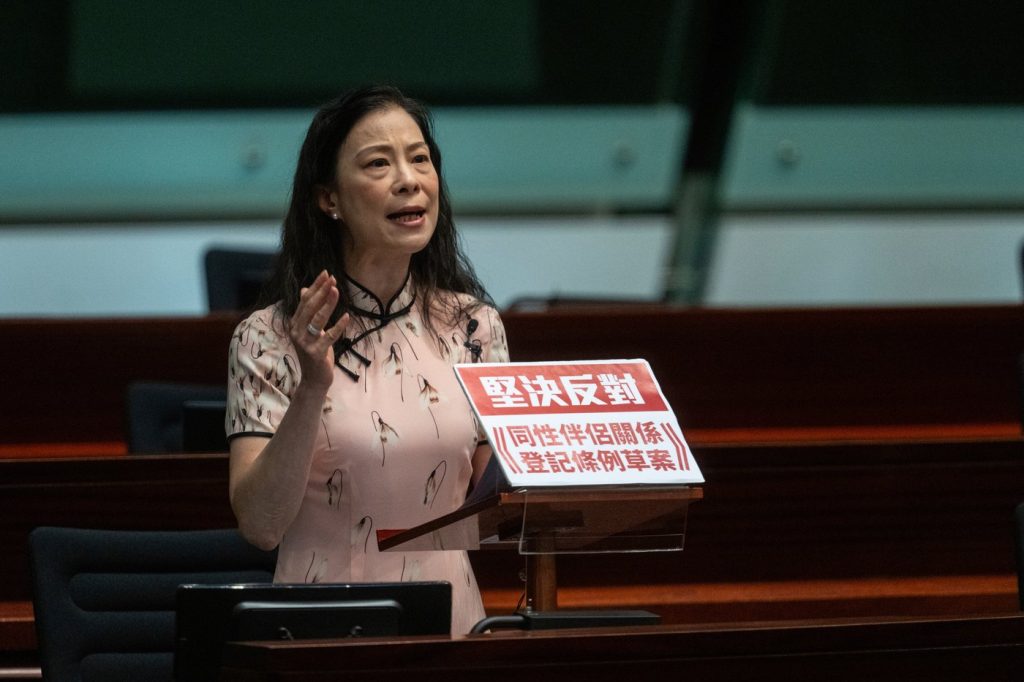HONG KONG (AP) — On Wednesday, Hong Kong lawmakers voted against the Registration of Same-Sex Partnerships Bill, a legislative effort aimed at granting limited recognition to same-sex partnerships within the city. This decision marks a significant setback for the LGBTQ+ movement in Hong Kong, particularly in light of the ongoing pursuit for greater equality and rights for same-sex couples.
The bill, introduced in July, was inspired by recent legal victories that compelled the Hong Kong government to provide more equitable rights for LGBTQ+ individuals. Despite a ruling by the city’s top court in 2023, which instructed the government to establish a framework for recognizing same-sex relationships, the bill was met with substantial opposition from various lawmakers. Critics argued that its passage would threaten traditional marriage values, which they emphasized should remain between one man and one woman.
The proposed legislation would have allowed individuals who have entered into same-sex unions abroad to register their partnerships in Hong Kong. It included limited rights for couples, such as the ability to access medical information, make medical decisions, and claim the remains of deceased partners. Nevertheless, many lawmakers preferred alternative solutions through individual policies rather than comprehensive legal recognition of same-sex partnerships.
Among the notable voices of opposition was lawmaker Holden Chow, who characterized the bill as a threat to Hong Kong’s marriage structure. Another legislator, Junius Ho, claimed that the acknowledgment of same-sex partnerships would lead society into unrest for the sake of a small minority. The atmosphere outside the legislative council reflected this sentiment, as demonstrators advocating for traditional marriage displayed their views through banners.
Advocates for gay rights expressed disappointment with the bill's limited parameters, noting that recognition would only be afforded to those who registered their partnerships overseas. Despite these limitations, there were efforts amongst some activists to support and push for the bill's passage, reflecting a strategy of pragmatism within the LGBTQ+ community. The organization Hong Kong Marriage Equality released a statement warning that rejecting the bill would erode the city’s commitment to inclusivity and fair treatment, negatively impacting Hong Kong's reputation on the international stage.
Surveys conducted prior to the vote indicated a shift in public sentiment, with about 60% of respondents expressing support for same-sex marriage in 2023, compared to 38% in 2013. This rise in acceptance could be attributed to successful legal challenges that have progressively secured more rights for LGBTQ+ individuals, including dependent visas and housing benefits. Recently, a court decision recognized a lesbian couple’s parental rights regarding their child conceived through in vitro fertilization, further illustrating the evolving legal landscape.
In response to the bill's rejection, Solicitor General Llewellyn Mui reminded that the court’s previous ruling remains valid, and that the government has an inherent responsibility to fulfill its obligations toward partnership recognition. The government had previously portrayed the bill as a compromise representing the “greatest common denominator” acceptable to the public, explicitly stating that it would not equate to marriage while providing a method to verify committed relationships through overseas registration.
In light of the legislative outcomes, Amnesty International Hong Kong and numerous rights groups across Asia called on the government to outline a contingency plan in the absence of the bill’s passage and urged the introduction of a revised proposal promptly. The next steps for the Hong Kong government regarding the recognition of same-sex partnerships remain unclear, but the need for action is underscored by the public's desire for increased equality and recognition.










